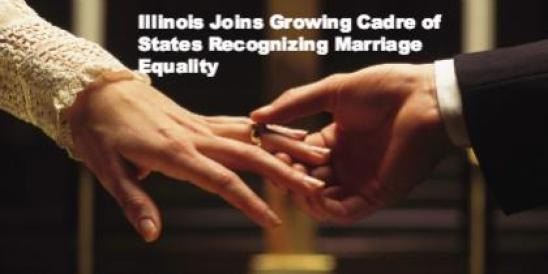On November 20, 2013, before a gathering of over 2000 people at the University of Illinois at Chicago Forum, Governor Pat Quinn officially signed the recently passed Illinois "marriage equality act" into law. Under the Illinois Constitution, because the law was passed after May 31 without a supermajority, it will not take effect until June 1, 2014.
When it takes effect next June, the Act repeals the same-sex marriage ban in Section 213.1 of the Illinois Marriage Act and provides that all laws of Illinois applicable to marriage (whether the laws derive from statute, administrative rule, court rule, policy, common law, or any other source of civil or criminal law) "shall apply equally to marriages of same-sex and different-sex couples and their children." Act, Sec.10(a). The Act specifically commands that the parties to a marriage and their children "shall have all the same benefits, protections, and responsibilities under law." Act, Sec. 10(b). The Act contains a "mini-Dictionary Act" including same-sex and different-sex marriage partners in all definitions or uses of terms for "spouse" or "family" or synonyms for such terms. Act, Sec. 10(c).
The Act also amends certain sections of the Illinois Marriage Act. Amended Section 201 recognizes marriages between "two persons" (rather than between "a man and a woman") that are "licensed, solemnized and registered" as provided in the Illinois Marriage Act. Amended Section 209 permits judges and ministers, clergy and other officiants to solemnize marriages of such couples. Amended Section 212(a) eliminates the ban against same-sex marriages. The Act also adds a new Section 65 to the Illinois Marriage Act governing conversions of civil unions without fee to marriages. It also adds a new Section 220 to the Illinois Marriage Act, under which same-sex couples married in the State of Illinois consent to the jurisdiction of Illinois courts "for the purpose of any action relating to the marriage, even if one or both parties cease to reside in this state."
While it recognizes marriage equality, the Act also delineates certain exemptions to permit the exercise of religious freedom in a balancing of rights that President Obama commended in his comments immediately after the Act's passage. Section 5 of the Act records its purposes and expressly notes that "[n]othing in this Act is intended to abrogate, limit, or expand the ability of a religious denomination to exercise First Amendment rights protected by the United States Constitution or the Illinois Constitution[,] nor is it intended to abrogate, limit, or expand the Illinois Human Rights Act or the Religious Freedom Restoration Act." Consistent with that statement of purpose, Section 15 of the Act cautions that "[n]othing in this Act shall interfere with or regulate the religious practice of any religious denomination or Indian Nation or Tribe or Native Group," and expressly leaves to such entities the "free[dom] to choose which marriages [each] will solemnize or celebrate." Again consistent with that statement of purpose, the Act also amends Section 209 of the Illinois Marriage Act to exempt ministers, clergy or officiants of such entities from solemnizing or celebrating same-sex marriages and grants them immunity from suit if they refuse to do so in order not to violate their religious beliefs. 750 ILCS 5/209(a-5). Similarly, the Act further amends Section 209 to provide that organizations "whose principal purpose is the study, practice, or advancement of religion" are not required to provide religious facilities for solemnizations or celebrations of same-sex marriages and grants them immunity from suit if they refuse to do so in order not to violate their religious beliefs. 750 ILCS 5/209(a-10). Amended Section 209(a-10) defines "religious facilities" to include "sanctuaries, parish halls, fellowship halls, and similar facilities," but to exclude "facilities such as businesses, health care facilities, educational facilities, or social services facilities."
Finally, the Act amends the Illinois Marriage Act to extend legal recognition to same-sex or opposite-sex marriages (other than common-law marriages) entered into "in another jurisdiction" in accordance with all provisions of the Illinois Marriage Act except Section 216 (the section providing that marriages of persons residing in Illinois entered into in other jurisdictions that would have been prohibited under Illinois law are null and void for purposes of Illinois law).
Now that the new Act has been signed, Illinois has become the 16th state in a growing list of states (including California, Connecticut, Delaware, Hawaii, Iowa, Maine, Maryland, Massachusetts, Minnesota, New Hampshire, New Jersey, New York, Rhode Island, Vermont, and Washington) that, along with the District of Columbia, recognize and permit same-sex marriages. Employers with employees working or residing in such states (including Illinois) should review their employment policies and benefit policies and plans and may wish to consult their Schiff Labor and Employment or Employee Benefits counsel regarding the ramifications of the new Illinois Act and its impact on their employees and their spouses and children.


 i
i


